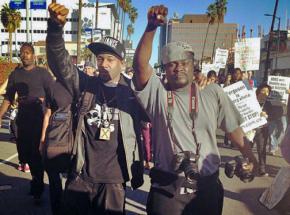The LAPD opens fire
reports from Los Angeles on a police killing that came amid an upsurge of protest against brutality and the injustice system.
SINCE THE decision not to indict the cops who killed Mike Brown in Ferguson, Missouri, and Eric Garner in New York City, protesters have taken to the streets across the country to express their outrage and demand justice--and Los Angeles is no exception.
In LA, the intersection of Hollywood and Highland has become a frequent gathering place for Angelenos organizing Ferguson-inspired protests against police violence, partly because the famous tourist area is easily accessible by public transportation.
But it took on greater symbolic importance for the movement on December 5 when two LAPD bicycle officers shot dead a still-unidentified man here for allegedly threatening them with what, according to conflicting eyewitness accounts, may have been a pocket knife, a fake stage knife, or no knife at all.
Hollywood and Highland is populated by a large number of struggling street performers, many of whom dress as famous movie characters to pose for pictures with tourists, in exchange for tips. Some area regulars knew the man killed by LAPD as a street performer named "J," who often dressed in the ghost costume popularized by the Scream horror movies and posed for pictures with tourists while brandishing a stage knife for dramatic effect. Eyewitnesses and police say that J was not dressed in costume when he was killed.

While withholding the identities of the two officers and the deceased "suspect" for over a week, the LAPD didn't hesitate to publicize, via its official Twitter account, a photograph of a pocketknife, similar to a Swiss Army knife, that was supposedly found at the scene of the shooting. The police also reported to the media that they were responding to a 911 call from someone claiming to have been stabbed with a knife, though Captain Peter Zarcone later admitted that police were unable to find any victims who were cut by a knife.
Reporters have noted that it's unusual for police to post pictures of evidence in active cases--leading to speculation that police were looking to justify their actions and attempting to prevent anger boiling over as a result of another unprovoked police shooting.
EVEN IF you chose to accept the LAPD's version of events, it's clear that J was--at worst--in possession of a weapon far less dangerous than those carried by the police, or the automatic rifles that notorious Nevada rancher and tax evader Cliven Bundy and friends recently pointed at federal law enforcement agents, without even being arrested, let alone injured or killed in response to their threatening actions.
The LAPD's response--to open fire in a heavily traveled tourist area--is also reminiscent of a 2013 shooting by the NYPD in Times Square, where police accidentally shot two bystanders while in pursuit of an unarmed Black suspect.
In that case, police actually initially charged the suspect they had been trying to kill with "assault" for the shootings that the police committed--arguing that the suspect "created the situation that injured innocent bystanders." Although no bystanders were injured in the LA shooting, bystanders reportedly had to scramble for cover in area stores when the police opened fire.
While details of [the December 6] shooting are still emerging, officers seemed to have engaged in the same rapid escalation that has been criticized in other recent shootings. In St. Louis this past August, officers shot a man holding a knife less than 20 seconds after arriving at the convenience store where he had allegedly stolen two cans of soda. While police in Los Angeles, St. Louis, and New York City have long been criticized over their deployment of lethal force, Burlington, Vt., officers had not fired their guns on duty in 16 years when they killed a mentally ill man last November because he was brandishing a shovel.
J was white, and a young white man identifying himself as J's cousin and fellow street performer has been deeply involved in the Hollywood and Highland protests against police violence. This led to an impassioned, but respectful debate among participants at a protest on December 7, over whether the movement should use the slogan #BlackLivesMatter or #AllLivesMatter.
While most participants agreed that "Black Lives Matter" correctly reflects the overwhelming reality that police forces in the U.S. target Black Americans more than anybody else for harassment, arrest and violence, the LAPD's needless killing of a young white street performer shows that this system will direct its murderous violence against all manner of impoverished and marginalized people.


